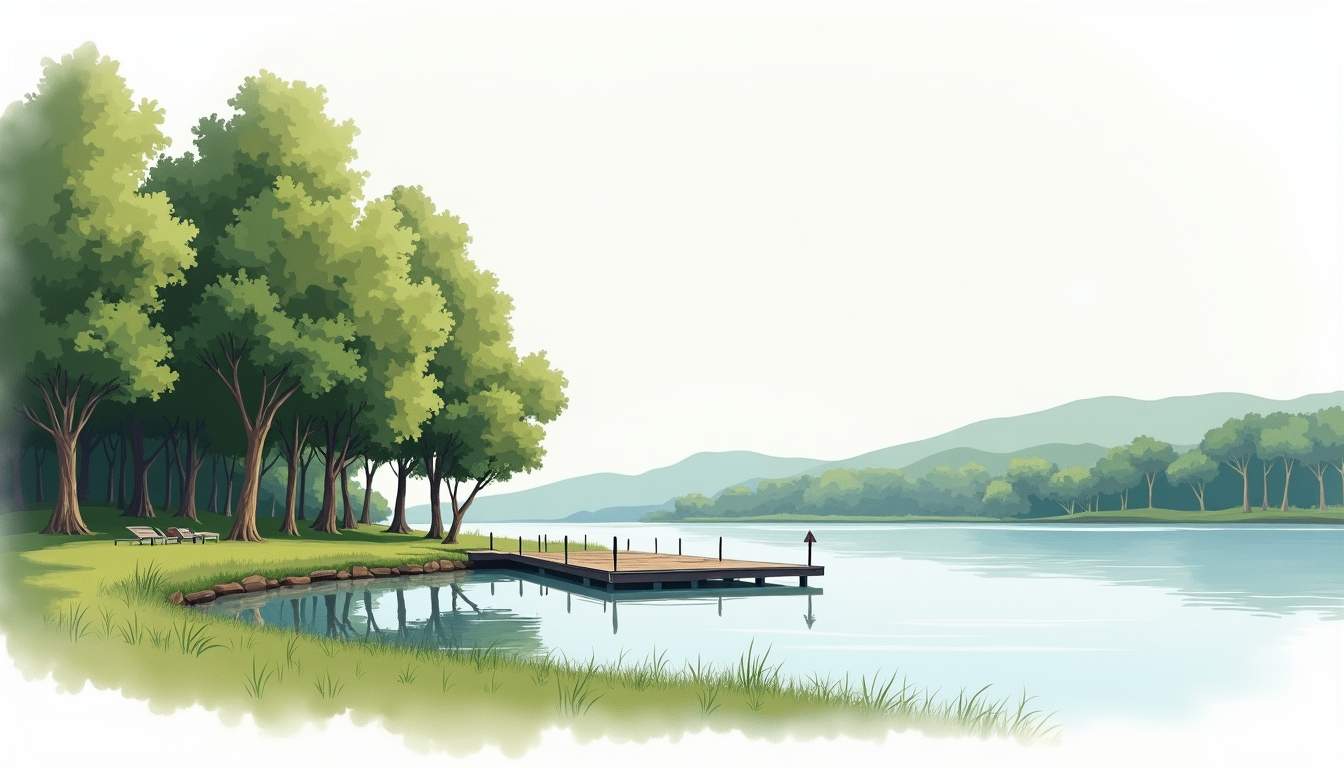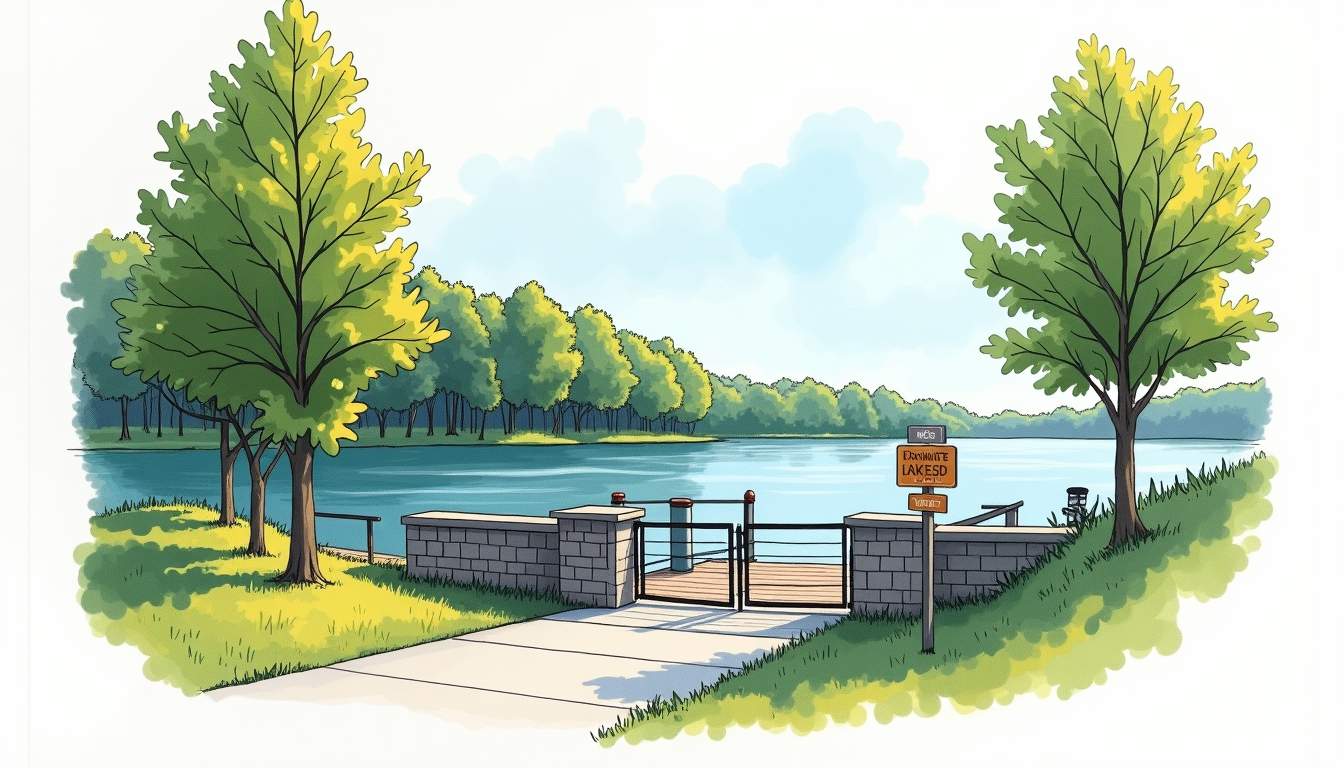
Watts Bar Lake, straddling parts of Tennessee's Tennessee Valley, offers wide stretches of shoreline, deep coves, and calm water favored by boaters, anglers, and families seeking lakeside serenity. Public boat ramps and parks are well known, but private shoreline access can mean quieter docks, exclusive views, and greater control over recreation. This article walks through realistic ways to find private access points and the legal, practical, and community steps required to secure waterfront entry without compromising etiquette or the environment.
Private access to Watts Bar Lake takes several forms. A property owner may own riparian rights and a dock, a homeowners association (HOA) may control a shared boat launch, an outfitter might rent private slips, or land under conservation easements might have restricted access with negotiated permissions. Each arrangement carries a different set of responsibilities and expectations.
Knowing the difference helps set realistic goals. Ownership gives the broadest rights, while leased or shared access requires more negotiation and adherence to rules. Public access remains the safety net — understanding it helps avoid accidental trespassing and informs conversations with property owners or associations.
In addition to legal rights, practical considerations affect private access. For example, maintenance responsibilities for docks or launch ramps often fall to the property owner or HOA, sometimes requiring periodic inspections or upgrades to comply with environmental regulations. Furthermore, seasonal conditions and water level changes on Watts Bar Lake can influence the usability of private access points, making flexibility important for owners and users alike.
Access can also vary depending on local zoning laws and state regulations, which may impose limits on the size and number of private slips or the types of watercraft allowed. Being aware of these rules not only protects property rights but also promotes harmonious relationships among neighbors sharing the shoreline. Consulting with local authorities before establishing or modifying access points is strongly recommended to avoid disputes or legal complications.
Riparian rights are legal interests that attach to land adjacent to water, often granting reasonable use of the water and the ability to build docks or boathouses subject to regulations. Owning land to the waterline does not always mean owning the land beneath the water; submerged land can be state-owned or held under different jurisdictions. Clarifying title and local statutes is essential before assuming rights to build or use a private access point.
Start with real estate listings, marina memberships, and local bulletin boards. Waterside properties often advertise private docks; private slips at marinas are sometimes transferable or rentable; and local businesses that cater to lake users maintain contacts for private launches. In addition, community groups and conservation organizations sometimes manage limited private access that can be negotiated for events or longer-term use.
County property records and GIS parcel maps offer a public trail of ownership. These tools can confirm whether a parcel includes shoreline and whether an owner has previously permitted dock structures. Archival aerial photos and historical maps also clarify whether a dock is longstanding and informs the likelihood of permit approval for new construction.
Marinas on Watts Bar Lake often offer private slips, covered storage, and concierge services. Some operate on a membership basis where long-term slip leases are preferentially offered to residents or existing members. Boat clubs are an increasingly popular option for those seeking private-style access without property ownership. Membership can include access to reserved slips, launch services, and social events — a practical middle ground for regular users.
Neighborhoods with waterfront properties frequently organize shared docks, private beaches, and gated launches. HOAs set rules for maintenance, guest use, and liability, so joining or partnering with an HOA is both a social and legal process. Prospective members should review covenants, conditions, and restrictions (CC&Rs) and budget implications for ongoing maintenance fees before committing.
Securing private waterfront access is not just about finding a dock; it involves complying with local, state, and federal regulations. Building a dock or altering the shoreline typically requires permits from the Tennessee Department of Environment and Conservation, the U.S. Army Corps of Engineers, and county zoning departments. Failure to obtain proper permission can result in fines and orders to remove unauthorized structures.

Legal tools such as easements can formalize access across private property. An easement grants a specific right — for instance, a pathway to the lake or the right to moor a boat — and is recorded with the property deed. Negotiating an easement often involves an attorney, a survey, and careful delineation of use, duration, and maintenance responsibilities.
Permit applications typically require site plans, environmental assessments, and evidence that the construction will not impede navigation or harm protected habitats. Local permitting offices provide checklists and pre-application meetings to reduce delays. Hiring a contractor familiar with Watts Bar Lake and relevant permitting agencies can streamline the process and minimize surprises.
Private access increases liability exposure. Owners or associations providing access should carry adequate general liability insurance to protect against accidents on docks and in shared areas. Boat owners should also maintain proper hull and liability coverage, and guests may be asked to sign waivers or follow posted safety rules. Clarifying insurance responsibilities before access is granted prevents disputes after an incident.
Respectful negotiation opens many doors. Property owners may be willing to grant access for reasonable compensation, shared maintenance, or reciprocal arrangements like helping with yard work or hosting neighborhood events. Clear, written agreements with defined terms reduce misunderstandings and create sustainable relationships.
When approaching owners, present a concise plan: how often access will be used, how the area will be kept clean, and proposed contributions to upkeep. Demonstrating awareness of environmental concerns and community standards builds trust. For longer-term arrangements, consider formalizing terms through a lease, license, or recorded easement.
Lease agreements can provide exclusive seasonal access and outline duties such as dock repair, septic considerations, or vegetation management. License agreements are more flexible, granting non-exclusive rights that can be revoked under specified conditions. Easements provide permanence and are preferable when access needs to be guaranteed across property sales.
Access logistics matter. Parking arrangements, boat trailer storage, and the condition of any pathway or stairway to the shore must be agreed upon. Maintenance schedules for docks, pilings, and seawalls should be clearly defined, with cost-sharing formulas when multiple parties benefit from the same improvements.

Being a considerate neighbor preserves access and fosters good will. Avoid late-night boat launches, control noise levels, and adhere to local speed zones. Keep the shoreline free of litter and invasive plant species. Communicating proactively about events or heavy use avoids surprises and strengthens relationships with property owners and other users.
Watts Bar Lake experiences seasonal water level changes and weather-related stresses. Docks and moorings must be designed to accommodate fluctuations and withstand wind and wave action. Routine inspections before and after storm seasons prevent small problems from becoming costly repairs. Environmentally sound practices — such as using non-toxic preservatives and avoiding shoreline fill — protect water quality and wildlife.
If private access proves unattainable, several compelling alternatives exist. Public boat ramps and parks provide dependable access points; regional marinas offer slips and launch services; and kayak or paddleboard rentals at commercial facilities make day trips easy. Many local outfitters provide drop-off services to more secluded coves for a fee, effectively creating private-feeling access for a short time.
Exploring community programs or conservation projects sometimes opens temporary access for research, birdwatching, or volunteer cleanup days. These activities both grant shoreline time and build networks that can lead to private arrangements in the future.
Public amenities can be used strategically to approximate private access: launching early on weekdays avoids crowds, using smaller craft enables exploration of quieter inlets, and combining public launch points with short paddles to secluded coves provides a sense of solitude without ownership. Knowing the lay of the lake and seasonal patterns helps maximize these options.
Before committing to private access, run through a checklist: confirm ownership and riparian rights, review local and federal permitting requirements, negotiate written agreements, obtain insurance coverage, clarify maintenance responsibilities, and consider environmental impacts. This due diligence protects both the seeker and the property owner and ensures long-term enjoyment of the lake.

Preserving the character and health of Watts Bar Lake relies on cooperative stewardship. Whether access is achieved through purchase, lease, membership, or negotiation, following legal requirements and community norms safeguards the lake for future visitors and wildlife alike.
Private access is attainable with research, respectful negotiation, and adherence to regulations. Marinas, HOAs, and property owners can offer opportunities, while legal tools such as easements and permits provide structure. Prioritizing safety, insurance, and environmental best practices keeps access sustainable and enjoyable.
For those intent on making Watts Bar Lake a regular destination, combining practical planning with community-minded behavior yields the best outcomes: quieter mornings on the water, secure mooring, and relationships that make private access both possible and pleasant.
For those inspired by the possibilities of private access to Watts Bar Lake, Tennessee National offers an exceptional opportunity to enjoy waterfront living within a luxury gated community. With exclusive marina access, breathtaking views, and resort-style amenities including a Greg Norman Signature Golf Course and waterfront dining, Tennessee National provides the perfect balance of privacy and lifestyle. Whether seeking a move-in ready home or a custom build, schedule a private tour today and start making treasured memories on the lake. Schedule a Private Tour